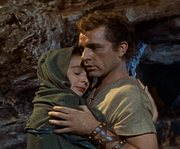
Diana (died 38 AD) was a Roman noblewoman and Christian martyr during the 1st century AD. She was a ward of the Roman emperor Tiberius and was originally betrothed to Caligula, but she ultimately chose to marry her childhood love Marcellus Gallio and converted to his Christian faith shortly before they were both executed on Caligula's orders.
Biography[]
Diana was born to a noble Roman family, and she grew up with the fellow patrician child Marcellus Gallio. At the age of eleven, she accidentally cut her finger, causing her to cry. Gallio responded by cutting his own finger to convince Diana that it didn't hurt, and he then kissed her and made her stop crying. Gallio promised that he would marry her when they both grew older, but Diana's father died soon after and she became a ward of Emperor Tiberius and was promised to his heir Caligula. Caligula and Gallio became fierce rivals over the years, partly due to their conflicting love for Diana.
Reunion with Gallio[]

Diana in 32 AD
Diana and Gallio reunited in front of Caligula's pavilion in Rome in 32 AD, and Gallio and Diana reminisced about their childhoods and their vow before Caligula's arrival interrupted them. Diana witnessed their rivalry resurface as Gallio outbid Caligula over the purchase of the Greek slave Demetrius, angering the prince and causing him to storm off. Diana went to Gallio's family to warn them of Caligula's wrath, and, shortly after, Marcellus returned home and was delivered a letter informing him that he was to be transferred to the Jerusalem garrison immediately. Diana visited Marcellus at the docks before he could leave, where they passionately kissed as Marcellus affirmed his love for Diana. Diana told him that she would travel to Capri to intercede on Marcellus' behalf, and she also promised to try and convince Tiberius to nullify her betrothal to Caligula.

Diana and Gallio talking on Capri, 33 AD
By 33 AD, Diana had convinced Tiberius to let her choose her own husband, and she reunited with Gallio when he returned to Capri at Tiberius' request after overseeing the crucifixion of Jesus. However, she noticed that he had taken ill and had gone mad, and he told her that he released her from their vow to marry. Diana, unfazed, accompanied Gallio to his meeting with Tiberius, and she persuaded Tiberius to give Marcellus another chance after he had a nervous breakdown. Tiberius then sent Gallio back to Palestine to hunt down the leaders of the Christian community and destroy Jesus' robe, which Tiberius' physician Dodinius claimed had bewitched Gallio.
Gallio's return[]

Diana and Gallio reuniting in the catacombs
It was another five years before Gallio returned, and, in this time, Gallio converted to Christianity, became a missionary alongside Saint Peter and Demetrius, and travelled from Palestine to Syria, Lebanon, Greece, Sicily, and Rome itself. Diana was kept at the imperial court by Caligula, who became emperor and sought for Diana to marry him (despite her avoiding his invitations). Diana had no contact with Gallio from 37 to 38 AD, the year of his missionary work, but Caligula informed her that the Antioch, Ephesus, and Corinth garrisons had reported that Gallio had become a Christian missionary. He showed her how his Praetorian Guard was torturing a captive Demetrius, disgusting her and causing her to tell Gallio's former servant Marcipor that Demetrius had been captured. When Marcipor took an interest in Demetrius' capture, Diana deduced that he might know where Marcellus was, and she then realized that Marcipor was a Christian. She convinced Marcipor to take her to Gallio, and she reunited with him in the catacombs, where the Christians had been hiding. Marcellus explained his faith to her, and, while Diana was not yet convinced of Jesus' message, she told Marcellus that she wanted to marry him regardless of his faith.
Marcellus rescued Demetrius from the armory that same night, and he, Marcipor, and Diana brought him to the Gallio estate, where Saint Peter came and miraculously healed him in front of Diana's eyes. Marcellus was disowned by his father Lucius Gallio after Peter left, as his father knew of Marcellus' Christianity and thus saw him as an enemy of Rome. Marcellus then bade farewell to Diana as he set out to help Demetrius reach Peter, but he was captured by Roman horsemen while buying time for Demetrius and Marcipor to escape.
Martyrdom[]

Diana and Lucius Gallio at the trial
Diana attended Marcellus' funeral as a guest of Marcellus' father, Senator Gallio, but Caligula forced her to sit next to him during the trial. When the Senate clamored for Marcellus' execution for his Christian beliefs, Caligula claimed that the people had spoken, but Diana rose from her seat and objected, claiming that his "slaves and parasites" had spoken. She then demanded that Caligula be just, and Caligula offered Gallio clemency if he would renew his oath of loyalty to Rome and renounce his faith. While Gallio renewed his tribune's oath, he refused to renounce his faith, so Caligula sentenced him to death.

Gallio and Diana walking to their martyrdom
However, Diana decided to join him, as she said that she had no desire to live under Caligula's corrupt rule, and she claimed that the noble blood of Rome had turned to poison in Caligula. Diana then professed her newfound Christian faith when she said that she wished to accompany Marcellus (whom she saw as her chosen husband) to his kingdom (Heaven), so Caligula had both of them sent to the palace archery field for execution. Before she could be taken away, she gave Jesus' robe (which Marcellus had given to her during the trial) to Marcipor, telling him to give it to "the big fisherman" (Peter). Marcellus and Diana then walked happily and side-by-side as they were escorted to their execution grounds, and they were martyred by the Roman archers shortly after. Their funeral was attended by leading Christians such as Peter and Demetrius.



